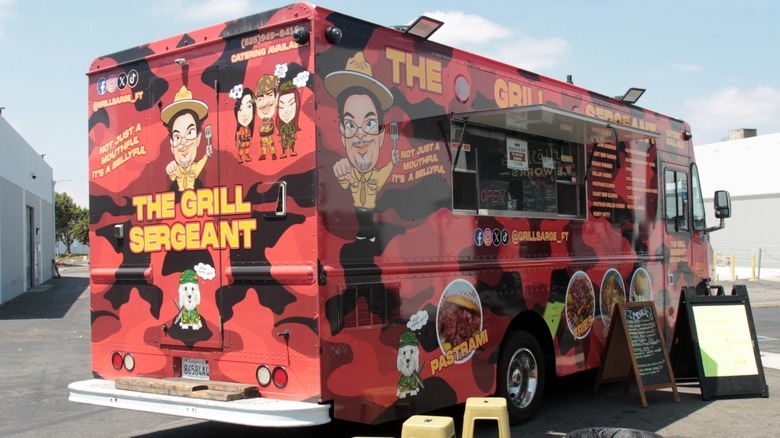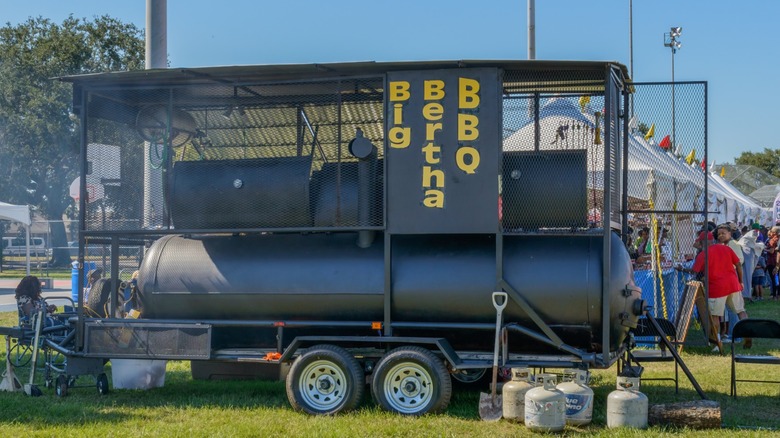
As of 2023, there were 36,000 food trucks in service in the U.S.A. That's a lot of street tacos, churros, and ice cream sandwiches. If you want to start one, you probably already have an idea about what kind of food you're going to serve. Maybe you've picked out a funky name for your business, but have you given any thought to the model of your food truck? That is an important decision, since the vehicle itself is going to serve as your restaurant on wheels.
The kind of food truck we've noticed the most is step vans. This is the kind of truck you probably picture when you're hungry for your favorite gourmet burger that you can buy from a stranger in a van. Step vans are perfect for food vendors with a wide variety of menu items. They are large and boxy, with plenty of room for equipment and food prep surfaces. The models we see mentioned the most are Chevy P30, Freightliner MT45, and Ford P700. If you have a smaller menu in mind, you may think about getting a more budget-friendly cargo van, like the RAM ProMaster or Ford Transit, which is so versatile, it's used for everything from camper vans to food trucks. A food trailer is also an option.
 mikeledray/Shutterstock
mikeledray/Shutterstock
Maybe you have big ambitions, and you're dreaming of selling a wide variety of gourmet burgers from your truck, then you'll need a lot of space for equipment and food prep. Step vans are often preferred by vendors with lengthy menus, mainly for the space. These trucks have plenty of room to install a stove, a deep fryer, refrigeration, and storage, with space enough left over for a couple of people to walk around. Sadly, some of us have lived in apartments with less square footage.
The Chevy P30 is the model we see mentioned most often by those in the industry. "P30" is actually the name of the chassis the truck is built on, and Chevy stopped building them in 1999. But you can still find plenty of used P30 step vans for sale. If you want a newer equivalent, Workhouse took over the step van chassis business from Chevy and started their own "W" series, with the W62 being a popular step van model.
However, Workhorse now concentrates on building electric-driven chassis instead of gas models. The Freightliner MT45 and Ford P700 are two other popular models. These vehicles can go all the way up to 30-feet-long and will set you back from $30,000 to over $100,000, if you buy new. Used models will cost substantially less, and it's not hard to find one that doesn't have a lot of miles on it.
 Jaclyn Vernace/Getty Images
Jaclyn Vernace/Getty Images
Do you need a spacious step van? Maybe you plan to start your own mobile version of Starbucks, for example. That espresso machine isn't going to take up a ton of space. The same goes for ice cream trucks. Mostly you'll be pulling an item from a small deep freezer.
So, if you have a modest menu in mind, you will probably want to consider a cargo van. Their smaller size makes them much easier to park than a step van, especially in a crowded downtown district. Cargo vans like the Ford Transit and RAM Promaster can be more affordable, depending on the model. A new Ford Transit will cost around $46,000, while the RAM Promaster is being sold for around $44,000. The recently discontinued Nissan NV Cargo van might cost you less than $30,000, if you can find one. Used versions of these models will cost even less. The Mercedes Sprinter van is always an option, but not a cheap one, as it starts around $50,000. However, there is an EV version of the Mercedes Sprinter, which should save on fuel costs.
Standard cargo vans range from 15- to 20 feet long, with cargo capacity from 200 to 500 feet. You can get extended versions that are 22 feet long. You'll want a high roof version, especially if you're tall. The height of a standard cargo van usually caps out at 6.5 feet, opposed to 7- or 8 feet in a high roof van.
 William A. Morgan/Shutterstock
William A. Morgan/Shutterstock
Depending on your needs, you might think about getting a trailer instead of a truck. Are you going to need special equipment like a barbecue smoker? That's hard to fit on the end of a van, which is why some vendors opt for trailers instead of trucks. There are other advantages to having a trailer instead of a truck. For one thing, your business doesn't have to stop because your vehicle is in the shop. And larger trailers have more interior space than even step vans, since there is no cab.
A trailer is cheaper than a truck and can be a more economical choice if you already own a vehicle that can handle towing a trailer. One popular brand, Diamond Cargo Trailers, can cost less than $6,000, when on the smallish side. They even have a 24-footer for less than $8,000.
Of course, if you thought trying to maneuver a step van through downtown traffic would be difficult, wait until you try doing it with a 20-foot trailer behind you. Before you decide to go find a trailer, find out where you'll be operating your business. Some locations have plenty of room for a tow vehicle and trailer, but many do not. And keep in mind, if you've never done it before, there is a learning curve when it comes to backing up a trailer.
 Pamela Lico/Shutterstock
Pamela Lico/Shutterstock
Are you still not sure which kind of food truck to get, or if you should maybe get a trailer instead? It's understandable, but it boils down to three things: menu, location, and budget. Your menu determines the equipment you'll have to have, as well as how much space you need for food prep and storage. If you're going to need an oven, hood, prep counter, deep fryer, and other equipment, then you're probably going to want a step van, like a Chevy P30 or Freightliner MT45, or a large trailer. If your equipment will consist pretty much of one machine, like a soft-serve ice cream machine, or you'll just be mixing smoothies, a Ford Transit or Ram PROMASTER cargo van should do. For special equipment like a smoker or pizza oven, think about opting for a trailer.
The right spot is everything when it comes to the success of a business. If the spot you've chosen has plenty of space, then you're good to go for a step van or trailer. If parking is tight there, you might have to scale down your menu so you can use a cargo van. And then there are finances. What if you have step van dreams but not a step van budget? Everyone has to start somewhere. You might begin with a small trailer or used cargo van and a modest menu, but that doesn't mean that's where you'll end up. Besides, if you cast a wide enough net, you just might find a gently used step van at a great price.














